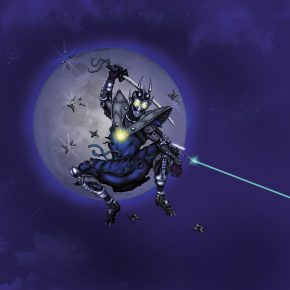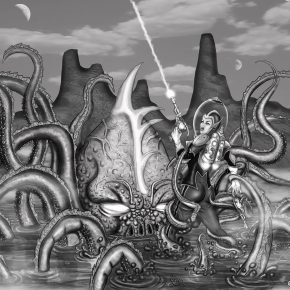Christopher Bernard’s Amor i Kaos (part 3)
It was almost too demeaning, she thought. To be hampered in that way despite all the options at the time. The seeming options, anyway. Because once you’ve done something, it seems as though it had always been meant to be, and so maybe the options were illusory after all. Amor fati…
—If only!
—No, really. Plus the beauty of matter, in Joubert’s lovely phrase. Because he was right, that Frenchman with the shy ambition and the small, beautiful notebook. So beautiful in its humble bravado, its bold modesty. All that clean, beautiful white space surrounding the few lovely words. No overwrought romantic windbaggery for him. But I’m drifting from the subject. Though what indeed was the subject? She looked at him with her usual skepticism. Did she love him? Maybe she did, in her peculiar way.
—My life is my hell, he told her one day. Matter-of-factly. I wish I could say I love it. I wish I could say I love you.
—Me too.
Then they parted for three days. Three weeks. Three months. Years. Decades. But not forever. They were adults. You would have thought they had learned never to be entirely sincere, that was what got young people always into so much trouble, the infatuation with “honesty,” no relationship will last five minutes of complete that.
—Apparently not.
—And so they tormented one another with their precious truth. You are my hell. A Sartrean proverb! And no one can leave hell. You see the problem.
But that meant nothing. Never even turned a hair. Minimally extant as it was. The withers unwrung, the moist appeal in the gathered vats, the wayward affront. The absolute right to one’s own life—to one’s own will. The boy who lived on the hill came to that conclusion one afternoon in the fall, as he was walking through the tall, yellowed hay at the edge of the field that bordered his family’s property. It was startlingly true. Nobody, but nobody, had a right to deprive him of his will. Nobody had a right to force him to sacrifice his will to anyone else, to a group, country, class, religion. They might have the power, the legal right, but they had no moral right. In that discovery lay his strength. His right to his will was absolute; this would become his moral compass.
—It should have turned him into a monster, acknowledged the portly man.
But no: just as no one had the right to deprive him of his will, so he had no right to deprive any other person of theirs. In his will lay his meaning, his joy. That seemed logical, right. Furthermore, the joy of other people increased his joy as long as it did not clash with it, and as long as he was happy in his will; if he wasn’t, nothing was surer to enrage him. The biggest threat to his will was, in fact, other people’s suffering, their pain, and their envy (ditto, in reversion, above). And this, which struck him like a hammer blow: the greatest source of the will’s joy, even at the core of its often deep and savage pain, was the perpetually deferred desire that is love, and not only for one but for all. The will is launched in pursuit. Life begins as desire and continues as love.




